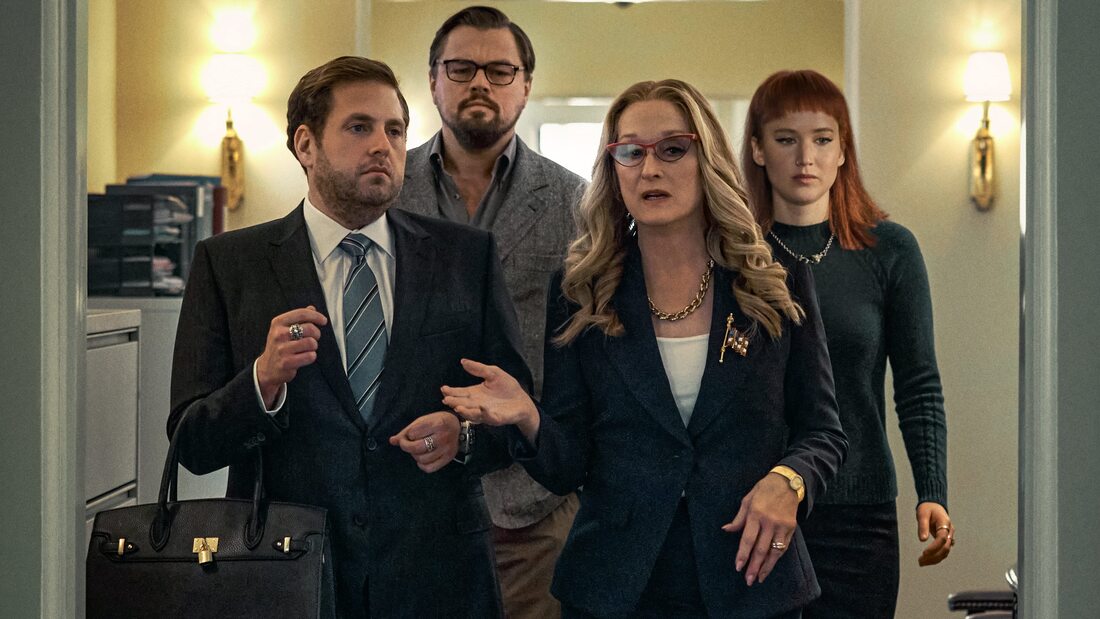McKay came of age in a period when slobs-versus-snobs dynamics were all the rage in the comedy world. Animal House, Revenge of the Nerds, Ghostbusters, these comedies and more would’ve shaped the generation that grew up in thrall to Steve Martin and Bill Murray and John Belushi. That dynamic is its own kind of poison, but snobs-versus-slobs, which Don’t Look Up is awash in, isn’t any better. This film is about the handful of smart people, of which McKay must be counted as one, up against the idiocy of the entire world in a way that is so smug and grating, that the rightness of the in-movie and allegorical message ceases to matter. It takes the side of the Ghostbusters technocrat who’s concerned about power usage and permits, and it takes his exact tone to do so.
The metatext of Don’t Look Up becomes unavoidable and further detracts. McKay and Sirota are both known entities, as is DiCaprio’s advocacy for solutions to climate change. They should know enough about working within liberal enclaves to be able to do more than aim for the lowest hanging fruit i.e. making fun of conservatives. While Orlean’s party is never explicitly mentioned, the film takes on the impossible task of attempting to satirize Trump, and fails for the reason that Trump satire always fails; no writer is going to top the strangeness and idiosyncrasy of the real guy. Orlean employs her useless family in jobs they aren’t equipped for, is obsessed with pop media acclaim, has an affinity for racist Southwestern sheriffs, and covers herself in tacky memorabilia, all while being the absolute worst person for the job. It’s braindead observation on the one hand, and muddled characterization on the other. Does she think Michigan State is a backwater for hicks, or does she have a tramp stamp? Those things don’t go together. This is especially strange coming from Sirota, a harsh critic of liberal establishment types who has the experience to know what he’s talking about. Instead, the film goes with the first pass from Stephen Colbert’s writing room and has nothing new to say about the government’s growing inability to solve problems.
While its political satire is dead in the water, Don’t Look Up marginally improves with its shots at tech and the media. Isherwood’s messianic quality was a trait missing from the greatest tech film thus far, The Social Network. Their confidence in their vision and its subsequent benefits to the species defines so many of these titans, and Isherwood embodies it as a Steve Jobs who lived and would’ve continued growing in strength until he felt perfectly comfortable yelling at a US president. Sirota and McKay also include the most chilling project these types are working on, namely ways to ensure their Randian survival in the event of a societal collapse. On the media front, the way that Mindy and Dibiasky are treated rings true, especially with the outbreak of Democrat Daddy sickness that’s afflicted the #resistance for several years, but the film misjudges the medium itself by relying so much on the morning show where the news is first broken. The passage of time within Don’t Look Up makes the media landscape feel narrow when it’s never been more fragmented, and the film’s take is that the comet becomes one story of hundreds, all delivered in GMA-style tone. That’s unrecognizable from the actual world, but here’s McKay scolding the audience for being distracted within this world that he’s created.
As an actual narrative, Don’t Look Up is incapable of being stripped of its political motivations. Characters are vehicles for sermonizing or embodiments of psychological phenomena. Mindy inhabits a rise-and-fall narrative so cursory as to be insulting to the characters around him. His fame drives him away from his family, who then offer no resistance when he comes crawling back, thus reducing his wife, played by the oft-great Melanie Lynskey, to a name on the call list. Dabieski vacillates between terror and black-pilled depression under a terrible haircut, eventually picking up a slacker boyfriend (Timothee Chalamet) who doubles as a humble Christian i.e. the only acceptable kind. Away from the characters, the broader plot centers a bygone can-do Americanism that short circuits any kind of Contagion-esque world-building, all while taking every opportunity to slag on the supposed vapidity of pop culture and the short attention spans it cultivates. Every step the film takes relies on some real-world equivalency or commentary, such that there’s no immersion and no investment in the survival of the world.
One can agree with everything Sirota and McKay are clumsily espousing in Don’t Look Up, and still despise the movie they made together. The right’s response to climate change evangelism is an infuriating sight to behold, but they’ve landed on something crudely effective when they criticize people like DiCaprio and Al Gore for their lavish lifestyles. Climate change is fundamentally a question of consumption, such that human beings consume too much and solving this problem will require less from everyone, especially those in advanced economies, and especially those who have the most, like the biggest names behind this movie. That’s about the most impossible message to sell, especially in America. Imagine French Yellow Vest protests, times 100. No one’s mind has ever been changed by genetic lottery winners scolding the broader public. How many people gave up meat after Joaquin Phoenix’s Oscar speech, and how many would have to if climate change was going to be seriously curbed? McKay and Sirota’s solution is condescension and alienation. D+

 RSS Feed
RSS Feed